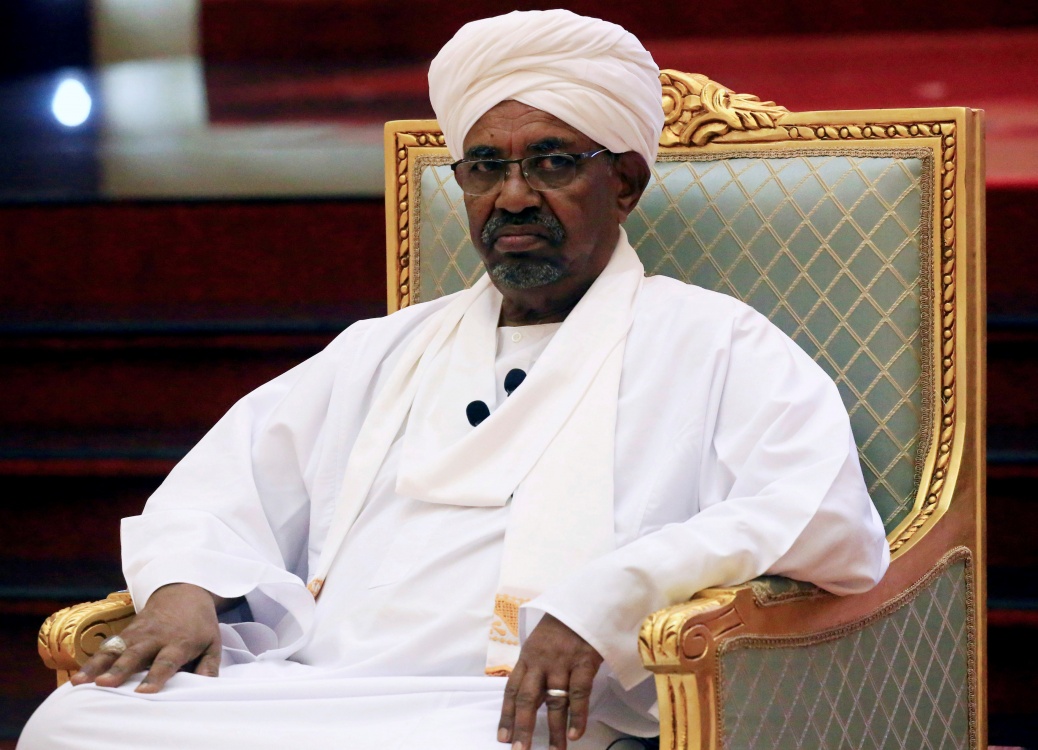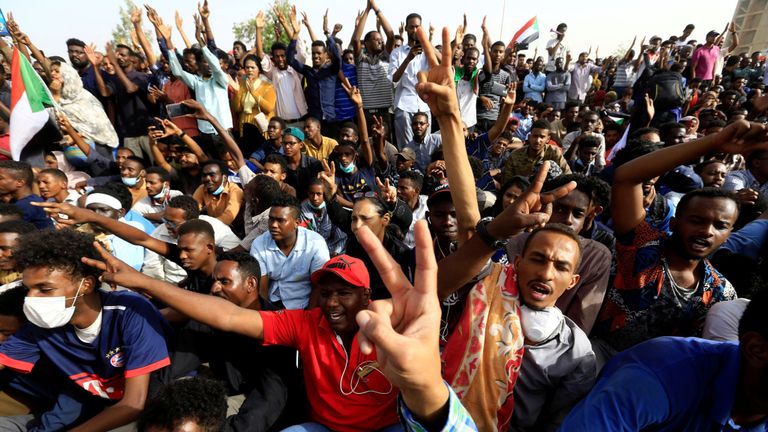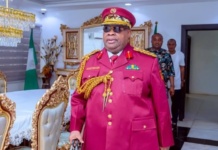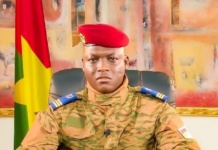By Peter Olorunnisomo – The several storms that raged and howls from within and without that followed the Sudanese leader couldn’t have been louder than at any point in time as it gradually gathered momentum to upstage him. He weathered several storms including armed rebellions, economic crises and attempts by the West to make him a pariah, yet it was not until Thursday that President Omar Hassan Bashir was forced to step down by the military after months of popular protests.

During his 30-year rule, Bashir was a master at playing rival factions among security services, the military, Islamists and armed tribes off against each other. But he clearly underestimated the growing anger of young Sudanese men and women demanding an end to economic hardships.
Bashir ultimately faced almost daily defiance in towns and cities across Sudan despite a crackdown by security forces using teargas and sometimes live ammunition, in which dozens of people have been killed.

Sudan’s National Intelligence and Security Service was quick to announce the release of all political prisoners across the country, shortly after his exit from office, state news agency SUNA reported on Thursday.
Shortly after the announcement, Twitter users circulated photos showing former detainees being welcomed by protesters as they joined demonstrations against Omar al-Bashir.
One of those released was Mohammed Naji Elasam, a spokesman for the Sudanese Professionals Association (SPA), the main organiser of protests being held across Sudan since December, witnesses said. Elasam had been detained for more than three months.
The Sudanese Professionals Association (SPA), which has been leading protests that have lasted over three months, has urged the armed forces to ‘handover power to the people’, according to what they described as ‘the declaration of freedom and change’.
‘‘We assert that the people of Sudan will not accept anything less than a civil transitional authority composed of a patriotic group of experts who were not involved with the tyrannical regime,’‘ read part of a statement issued on their website on Thursday.
Omar Saleh Sennar, a senior member of the SPA said the group was waiting for a statement by the army and expected to negotiate with the military over a transfer of power away from Bashir.
According to Reuters, soldiers raided the headquarters of the Islamic movement led by Sudan’s Omar al-Bashir in the capital Khartoum on Thursday.
The Islamic movement is the main component of Sudan’s ruling party. Government sources said Bashir had stepped down and consultations were underway to form a transitional council.
Now that he has stepped down, consultations are under way to form a transitional council to run the country, government sources and a provincial minister said on Thursday.
The minister of production and economic resources in North Darfur, Adel Mahjoub Hussein, told the Dubai-based al-Hadath TV that “there are consultations to form a military council to take over power after President Bashir stepped down”.
Sudanese sources confirmed the report and told Reuters Bashir was at the presidential residence under “heavy guard”.
Military to make announcement soon: state media
The military is expected to make an announcement soon (Thursday), state television said as troops were deployed in Khartoum.
“The armed forces will present an important statement shortly. Be ready for it,” the announcement on state television read, without giving further details.
The army and security services deployed troops around the defence ministry and on major roads and bridges in the capital as thousands of people flocked to an anti-government protest outside the ministry, a Reuters witness said.
Tens of thousands of Sudanese took to the streets in the centre of Khartoum in jubilation, dancing and chanting anti-Bashir slogans.
Protesters outside the defence ministry chanted: “It has fallen, we won.”
State television and radio played patriotic music, reminding older Sudanese of how military takeovers unfolded during previous episodes of civil unrest.
A descending highlight of his grip on power is highlighted below:
April 11, 2019: Bashir steps down
Bashir was forced to step down by the military on Thursday after popular protests.
The minister of production and economic resources in North Darfur, Adel Mahjoub Hussein, told the Dubai-based al-Hadath TV that “there are consultations to form a military council to take over power after President Bashir stepped down”.
Tens of thousands of people danced and chanted anti-Bashir slogans in the streets of Khartoum.
In this article, we look at key highlights and dates of Bashir’s reign since he came to power three decades ago.
1989: coup
In June 1989. army brigadier Bashir seizes power in a coup backed by Islamist ideologue Hassan al-Turabi.
Sudan then hosts radical Islamists, including Al-Qaeda chief Osama bin Laden who remains until 1996.
A leadership power struggle erupts in 1999 and Bashir forces Turabi from the ruling circle.
2003: rebellion in Darfur
In 2003, a rebellion erupts in the vast western region of Darfur, which complains of economic and political marginalisation.
The conflict kills 300,000 people and displaces nearly 2.5 million, according to UN figures, before largely diminishing.
The International Criminal Court in 2009 indicts Bashir for war crimes and crimes against humanity in Darfur, and a year later for genocide. Bashir denies the charges.
2005: civil war ends
Khartoum signs a peace treaty in 2005 with southern rebels after a north-south civil war that lasted more than two decades, leaving two million people dead and a further four million displaced.
The agreement schedules a referendum on independence for 2011.
2010: vote boycotted
In 2010, Bashir is elected in the first multiparty election since 1986, but voting is boycotted by the opposition and criticised abroad.
He is re-elected in 2015.
2011: South Sudan born
In July 2011, South Sudan breaks away, six months after the scheduled referendum overwhelmingly approves independence.
The Sudan People’s Liberation Army-North launches insurgencies in South Kordofan and Blue Nile states.
2012: war for oil
In early 2012, fighting breaks out along the border between Sudan and South Sudan over oil fields in an area claimed by both.
South Sudan shuts off oil production for more than a year, hitting the economies of both countries.
2013: deadly demonstrations
Khartoum lifts petrol subsidies in late 2013, causing prices to rocket by more than 60 percent and sparking broad public anger.
Demonstrations turn into anti-government protests and the security forces respond with force. Amnesty International says more than 200 people were shot dead, while the government puts the toll at dozens.
2016: Darfur referendum
Darfur holds a referendum in April 2016 on whether to unify its five states, a long-standing demand of rebels seeking greater autonomy.
The poll is boycotted by the opposition and criticised internationally, with the result backing the division of the region.
In August, negotiations fail between the regime and rebels on a cessation of hostilities in Darfur, Blue Nile and South Kordofan.
The following month Amnesty says government forces used suspected chemical weapons in 2016 in Darfur, killing scores of civilians. Khartoum denies the allegations.
In November, Sudan hikes fuel prices by around 30 percent, sparking new nationwide strikes.
2017: US embargo ends
In October 2017, the United States ends its 20-year-old trade embargo against Sudan, imposed over alleged support for Islamist militant groups.
But Washington does not drop Sudan from its blacklist of “state sponsors of terrorism”.
2018: Bread protests
In early 2018, demonstrations erupt over soaring food prices, notably of bread. They are swiftly dispersed and opposition leaders and activists rounded up.
In August, the ruling party nominates Bashir as its candidate for the 2020 presidential election, despite the constitution having a two-term limit.
December 2018: current wave of protests begins
On December 19, protests begin in several towns after the government triples the price of bread, soon turning into rolling nationwide anti-government rallies.
The demonstrations continue into 2019, with some political groups calling for a “new regime”.
Authorities are accused of a harsh crackdown, including using live ammunition, with Human Rights Watch saying at least 51 people have been killed since the start, although the official toll is around 31.
A top US official warns that talks to remove Sudan from its list of state sponsors of terrorism could be detailed unless the authorities rein in their crackdown on protesters.
Humble beginnings
Bashir was born on Jan. 1, 1944 to a poor farming family in Hosh Bannaga, a small village consisting mainly of mud houses and dusty streets on the eastern bank of the Nile River, some 150 km (93 miles) north of the capital Khartoum.
He has often played up his humble beginnings. In January, he repeated a story he told in 2013 of how he broke a tooth while carrying concrete at a construction site where he worked as a student to pay for his education.
Bashir said he refused a silver tooth implant when he joined the military because he wanted to remember that incident whenever he looked in the mirror.
As a young officer in the parachute regiment, he joined the armed wing of the Islamist Movement, which broke away from the Muslim Brotherhood and has ruled Sudan since Bashir took office.
Kindly follow us on twitter:@AfricanVoice2









